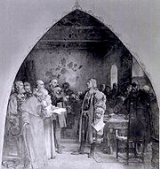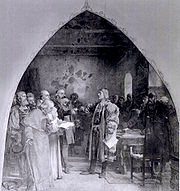
Vetkopers and Schieringers
Encyclopedia
The Schieringers and Vetkopers were two opposing Frisian
factional parties from the medieval period. They were responsible for a bloody civil war that lasted for over a century (1350–1498) and which eventually led to the end of the highly praised "Frisian freedom
".
These factional parties arose because of an economic downturn that began in Friesland
in the mid-14th century. Accompanied by a decline in monasteries and other communal institutions, social discord led to the emergence of untitled nobles called hoofdelingen ("headmen"), wealthy landowners possessing large tracts of land and fortified homes. The hoofdelingen derived their nobility not from having lands and titles conferred on them by King or Emperor but assumed power after the demise of the Dutch counts before them.
The hoofdelingen took over the role of the judiciary as well offering protection to their local inhabitants. Internal struggles between regional leaders resulted in bloody conflicts and the alignment of regions along two opposing parties: the Schieringers and the Vetkopers.
Worp van Thabor attributed the cause to a dispute between lay brothers of the Cistercian and Norbertine (Premonstratensian) orders.
 A contemporary, Frisian freedom fighter Jancko Douwama
A contemporary, Frisian freedom fighter Jancko Douwama
(1482–1533), wrote in his memoirs, titled the Boeck der Partijen ("Book of the Parties") about the origins of the discord between the warring parties in Friesland and his definition of the terms Schieringers and Vetkopers. According to Jancko the Vetkopers ("fat buyers") were so called because they had much and could buy fat products. The poor adopted the name Schieringers ("speakers") because they had tried firstly discussion rather than violence.
In the second half of the fifteenth century the Vetkoper town of Groningen
, which had become the dominating force in Frisia, tried to interfere in Mid-Frisian affairs. The meddling met strong opposition in Schieringer held Westergo and ended in a call for foreign help.
On 21 March 1498, a small group of Schieringers from Westergo secretly met with the stadholder-general of the Netherlands, Albert, Duke of Saxony
in Medemblik
requesting his help. Albrecht, who had gained a reputation as a formidable military commander, accepted and soon conquered all Friesland. Emperor Maximilian of Habsburg
appointed Albrecht hereditary potestate and gubernator of Friesland in 1499.
Within a short time, occupation by the Duke and his Landsknecht
military force became unacceptable to many Frisians of both factions and with the support of the Duke of Gelderland, they unsuccessfully attempted to regain their old freedoms and put an end to the de-Friesing of Friesland.
Saxon subjugation ended Frisian municipal independence. Although still spoken at the time, the Frisian language did not have any official status. Frisian would disappear from the official written record; the last official document recorded in Frisian was in 1573.
Frisian was replaced by Dutch and would not return until about 1800.
Frisians
The Frisians are a Germanic ethnic group native to the coastal parts of the Netherlands and Germany. They are concentrated in the Dutch provinces of Friesland and Groningen and, in Germany, East Frisia and North Frisia, that was a part of Denmark until 1864. They inhabit an area known as Frisia...
factional parties from the medieval period. They were responsible for a bloody civil war that lasted for over a century (1350–1498) and which eventually led to the end of the highly praised "Frisian freedom
Frisian freedom
Friese freedom or freedom of the Frisians is the absence of feudalism and serfdom in Frisia, the area that was originally inhabited by the Frisians, in particular the current provinces of Friesland and Groningen and the area west Friesland in the Netherlands and East Friesland in Germany...
".
These factional parties arose because of an economic downturn that began in Friesland
Friesland
Friesland is a province in the north of the Netherlands and part of the ancient region of Frisia.Until the end of 1996, the province bore Friesland as its official name. In 1997 this Dutch name lost its official status to the Frisian Fryslân...
in the mid-14th century. Accompanied by a decline in monasteries and other communal institutions, social discord led to the emergence of untitled nobles called hoofdelingen ("headmen"), wealthy landowners possessing large tracts of land and fortified homes. The hoofdelingen derived their nobility not from having lands and titles conferred on them by King or Emperor but assumed power after the demise of the Dutch counts before them.
The hoofdelingen took over the role of the judiciary as well offering protection to their local inhabitants. Internal struggles between regional leaders resulted in bloody conflicts and the alignment of regions along two opposing parties: the Schieringers and the Vetkopers.
Worp van Thabor attributed the cause to a dispute between lay brothers of the Cistercian and Norbertine (Premonstratensian) orders.

Jancko Douwama
Jancko Douwama was a Frisian nobleman who fought to free Friesland from foreign rule.He was born in 1482 into a Vetkoper 'hoofdelingen' or 'untitled noble' family near Oldeboorn, Friesland. He was the son of the chieftain Douwe Douwama and his wife Riem Eesckes...
(1482–1533), wrote in his memoirs, titled the Boeck der Partijen ("Book of the Parties") about the origins of the discord between the warring parties in Friesland and his definition of the terms Schieringers and Vetkopers. According to Jancko the Vetkopers ("fat buyers") were so called because they had much and could buy fat products. The poor adopted the name Schieringers ("speakers") because they had tried firstly discussion rather than violence.
In the second half of the fifteenth century the Vetkoper town of Groningen
Groningen (province)
Groningen [] is the northeasternmost province of the Netherlands. In the east it borders the German state of Niedersachsen , in the south Drenthe, in the west Friesland and in the north the Wadden Sea...
, which had become the dominating force in Frisia, tried to interfere in Mid-Frisian affairs. The meddling met strong opposition in Schieringer held Westergo and ended in a call for foreign help.
On 21 March 1498, a small group of Schieringers from Westergo secretly met with the stadholder-general of the Netherlands, Albert, Duke of Saxony
Albert, Duke of Saxony
Albert III was a Duke of Saxony. He was nicknamed Albert the Bold or Albert the Courageous and founded the Albertine line of the House of Wettin....
in Medemblik
Medemblik
Medemblik is a municipality and a town in the Netherlands, in the province of North Holland and the region of West-Frisia.- History :...
requesting his help. Albrecht, who had gained a reputation as a formidable military commander, accepted and soon conquered all Friesland. Emperor Maximilian of Habsburg
Maximilian I, Holy Roman Emperor
Maximilian I , the son of Frederick III, Holy Roman Emperor and Eleanor of Portugal, was King of the Romans from 1486 and Holy Roman Emperor from 1493 until his death, though he was never in fact crowned by the Pope, the journey to Rome always being too risky...
appointed Albrecht hereditary potestate and gubernator of Friesland in 1499.
Within a short time, occupation by the Duke and his Landsknecht
Landsknecht
Landsknechte were European, predominantly German mercenary pikemen and supporting foot soldiers from the late 15th to the late 16th century, and achieved the reputation for being the universal mercenary of Early modern Europe.-Etymology:The term is from German, Land "land, country" + Knecht...
military force became unacceptable to many Frisians of both factions and with the support of the Duke of Gelderland, they unsuccessfully attempted to regain their old freedoms and put an end to the de-Friesing of Friesland.
Saxon subjugation ended Frisian municipal independence. Although still spoken at the time, the Frisian language did not have any official status. Frisian would disappear from the official written record; the last official document recorded in Frisian was in 1573.
Frisian was replaced by Dutch and would not return until about 1800.

